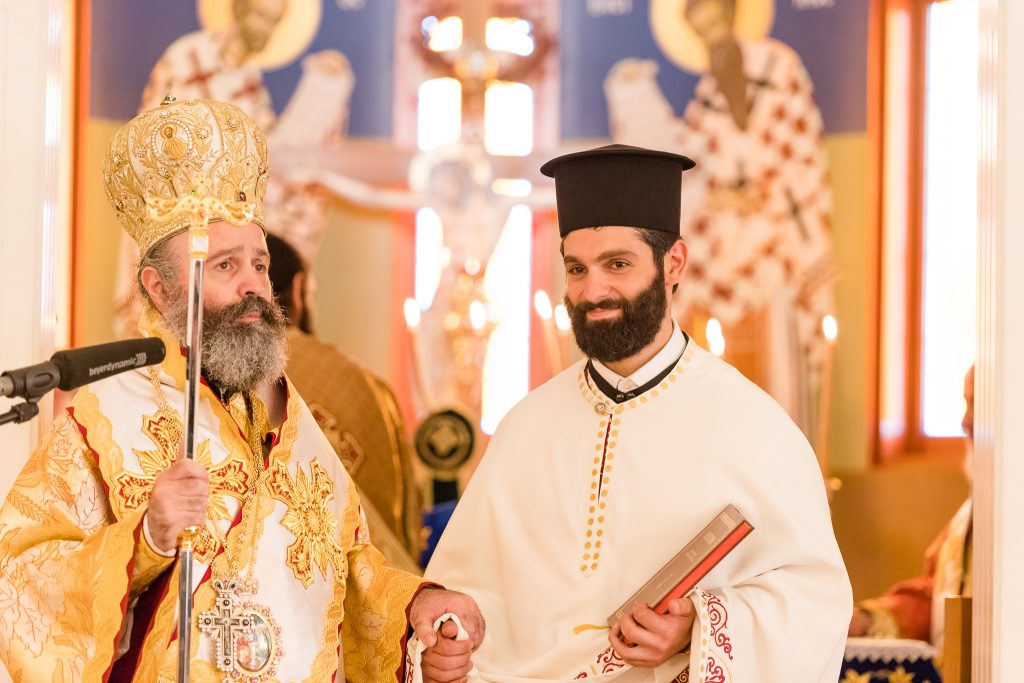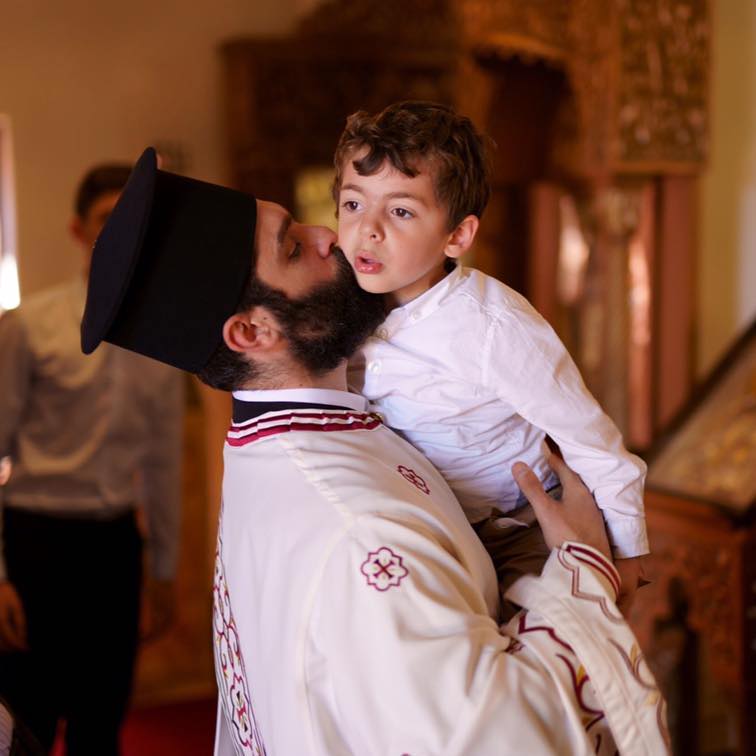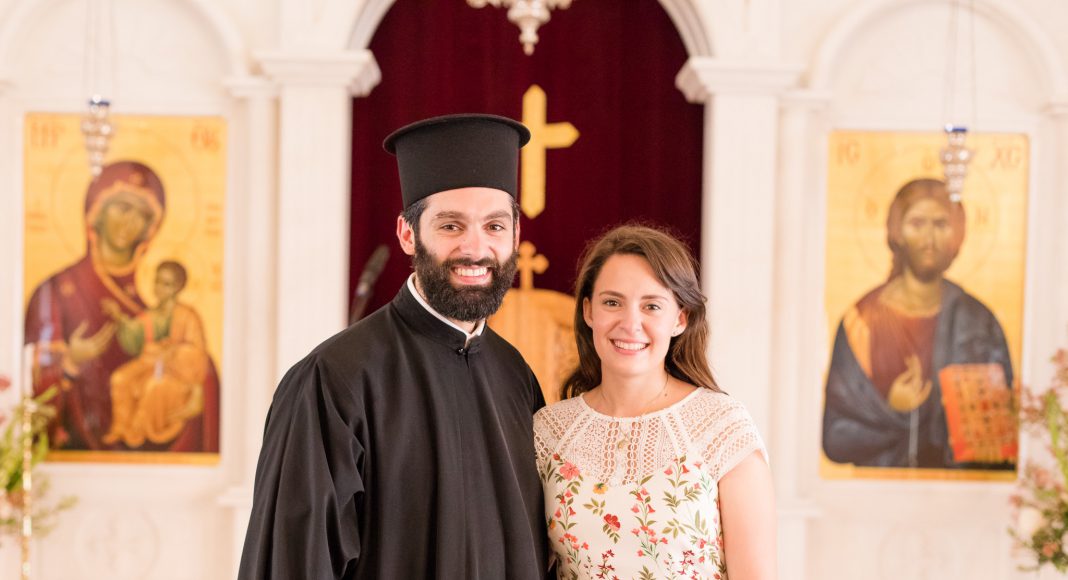There is often a cloud of uncertainty that surrounds the lives of Greek Orthodox priests, and a lot of confusion surrounding certain “rules” of how they can and can’t live their lives.
On the 29th of December 2019, 29-year-old engineer, husband and parent, Father Terry Gerovasilis, was ordained as a Priest at St Stylianos Church in Gymea, by His Eminence Archbishop Makarios.
Father Terry was born and raised in Wollongong, New South Wales, and was immersed in Greek Orthodoxy from a young age.
His connection to clerical life did not fade as he grew, and his commitment to his faith did not limit him from accomplishing any of his personal goals either.
Father Terry graduated with a Bachelor of Materials Engineering at the University of Wollongong and has been working for BlueScope (Australia’s largest steel manufacturer) for 10 years now.
In 2013, he also began studying at St Andrew’s Greek Orthodox Theological College and is completing his Bachelor of Theology.
Father Terry has been married to Stamatia Gerovasilis, the daughter of Father Constantine Varipatis, parish priest at St Stylianos in Gymea, for 5 years. The young couple have two sons, George, 4, and Dean, 2.
A job opportunity with his company took him to Perth in 2018, where he and his family uprooted and integrated into Perth’s Greek Orthodox Community. It was with the “guidance of some amazing priests here in Perth”, that inspired Father Terry to take the plunge and pursue his lifelong passion of becoming a priest.
But what exactly does this mean for a young family finding their feet in a modern Australian context? And how does becoming a priest effect ones every day life? Father Terry Gerovasilis speaks exclusively to The Greek Herald.

What led you to the decision to becoming a priest?
My maternal Grandfather is a priest (Fr Nicolaos Bozikis from Sydney) so I was exposed to clerical life and the church from a very young age.
Then in 2019, while living here in Perth, I was approached by the local priests about being ordained and serving as a cleric here in Perth. We had a meeting with His Eminence Archbishop Makarios here in Perth where we expressed our intention to join the clergy. He gave us his blessing and said that he would return to Perth of October 12th to ordain me as a deacon.
Can you give us a bit of a run down on the process?
There are three levels of Priesthood in the Orthodox Church: Deacon, Presbyter (Priest) and Bishop. A Deacon (being the first level of Priesthood) cannot give a blessing or perform services or sacraments on his own. He always must serve with a Priest or Bishop. He is effectively a helper during the services (deacon in Greek means a server).
A Deacon can then be further ordained to the Priesthood. The Bishops are ordained from amongst the monastic Priests (that is the unmarried Priests). A Deacon and Priest can be married or unmarried in the Orthodox Church.
To be ordained as a Deacon, you have to have made the decision about whether you want to be married or unmarried. You must be baptised Orthodox and have a good standing in the Orthodox Church and community. You should ideally have some formal education or training in the theological and ecclesiastical field. This should include formal tertiary education and more informal training and knowledge of the order and conduct of Orthodox services. You should then approach your local Priest and Bishop and express your desire to serve in clerical mionistry.
Ultimately then, it is up to the Archbishop of the Church here in Australia as to whether you are suitable or eligible to be ordained into clergy.
Personally, I think it is important that you bring into your ministry the collective experiences of your life. We are all humans and we all sin and we all make mistakes. With faith and guidance from your Spiritual Father or Mother, all the experiences of your life can be transformed into wisdom and good lessons you can pass on to others.
How does it affect your life now? Are there things you won’t be allowed to do?
For the near future, I will continue to work my normal Monday to Friday job as a Materials Engineer. This is obviously a great struggle for myself and my family but with God’s grace we can keep all things in balance.
When I am not at work during normal Monday to Friday office hours, I will effectively operate a clergyman attached to a parish. I assist in Divine Liturgies and sacraments on the weekends as well as assisting with other dimensions of parish life. I will now also proceed to wear the clerical robe whenever I am not at work.
So yes there are some major changes – much less free time and more duties and responsibilities.
But I am so passionate about the church, the spiritual life and the ecclesiastical life that it all feels very natural and enriching. I hope and pray that our family can bring joy to those around us in the Church.
“WE ARE ALL HUMANS AND WE ALL SIN AND WE ALL MAKE MISTAKES.”
Do you feel that a lot of young people, particularly third-generation Greek Australians that are entering adulthood now, are straying from religion?
No – I don’t think people are straying from religion. Religion is a very broad term which simply pertains to the set of values and beliefs that govern your life, and the means by which you explain the world around you.
Secularism – or the so called absence of religion – is still a religion in itself. It uses science to explain the world and logical reason to govern your actions.
In this sense, the challenge for Christianity, it not to bring people back to religion, but rather to explain to people the way by which Christian beliefs should govern our actions and how Christianity explains the world around us.
This is not a problem of religion or church – but rather a pastoral problem: how do we as Christians bring the joy and Grace of Jesus Christ into the lives of those around us?
In this sense, the most important thing Christians must do is not evangelise, but simply follow the example of St Paul and practise a ministry of love. We should demonstrate to people by the mode and manner of life what Christianity is.
How do you feel about the church adapting to more modern/progressive thinking in order to respond to the progression of society?
This is obviously a very complicated question that could be answered in so many ways. To simplify it, I might reiterate the sentiments of His Eminence Archbishop Makarios when he said, of his ministry here in Australia, that he has come here to SERVE the people of Australia. Not to RULE or BE served.
In this spirit, I would simply say that the best way the Church aims to adapt to a progressive society is to humbly maintain its role as servant.
Servant to those most in need.
What do you see your role as a young priest to be? What impact would you like to make on young Greek Australians?
Again we follow here the example of Christ, reiterated by Archbishop Makarios – to serve. In Greek, Deacon means a servant.
Of course I could charge into a progressive university any day of the week and engage the students there in high-level philosophical and theoretical arguments about the nature of the universe, God and faith. But would I really leave any of those students with a sense of joy, Grace or love…probably not.
Rather, if I run a food drive at my local church for the homeless or go to the nursing home to minister to the old people, or perhaps even attend a prison to speak with a young Greek inmate – would this not be more effective in spreading the love and word of God?
How do you think the church can respond to getting young Greek Australians more involved in church?
I certainly think that young Greek Australians (and young Orthodox Christians in general) want more English in the services and more English ministry.
People like myself – Greek Australians with theological training – simply must endeavour to translate the Orthodox Hellenic ecclesial and theological spirit into something meaningful, relatable and understandable for the current generation.
We don’t need to re-invent the wheel (as the saying goes). We just need to find a way to make the message (the Good News of Jesus Christ) meaningful and alive in the lives of young Australians.

Are you finding there are any disparities between raising your own family in Australian culture, whilst still trying to maintain traditional Greek Orthodox customs?
Certainly. An example – Sunday has simply lost its special sense of ecclesial celebration in modern Australian culture. Sunday has simply become the last day of the week. Another weekend day off. A day of sleep in, rest and breakfast down at the beach.
In Greek, Sunday means the day of the Lord! It is a day of great joy as we celebrate the Resurrection of Jesus Christ.
How do we instil in young Orthodox Australians the appreciation of Sunday Liturgy? I’m not sure I have the answer right now but I hope I might find it on the journey of my ministry.
What’s your favourite thing about being Greek?
Honestly – the language. By his divine providence, God used the beauty of the Greek language and the Hellenic philosophical framework to convey to humans an understanding of his mystical nature. The Old Testament (that is the Jewish holy texts) has been preserved and conveyed to the world via the Greek Septuagint translation. Furthermore, all the early Church Fathers used the Greek language (including St Paul) to convey in a meaningful way to the world the theological vision of God as revealed by Jesus Christ.
We now have the immensely exciting and daunting task of making that Greek language meaningful and accessible to English speaking people in a way that makes the message and meaning, transformative.

